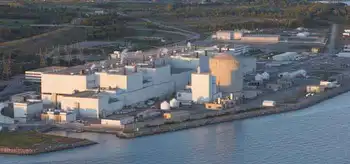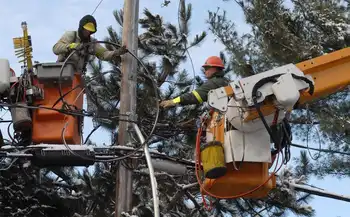Early closures could mean power shortages
By Edmonton Journal
High Voltage Maintenance Training Online
Our customized live online or in‑person group training can be delivered to your staff at your location.

- Live Online
- 12 hours Instructor-led
- Group Training Available
Ottawa has yet to decide on whether it will allow the plants to operate for 45, 50 or 55 years. There is no scheme for plants to buy carbon offsets to extend their lives, so there will be a “hard shutdown” when the dates are reached.
That 10-year spread is crucial for Alberta, which is scrambling to ensure there will be sufficient low-cost electricity available.
“If they enact regulations with a 45-year limit, we will have to shut down Battle River units 3 and 4 in 48 months. That is 500 megawatts, and Alberta is already short because of the loss of TransAlta’s Sundance 1 and 2 units,” Nancy Southern said after the Canadian Utilities Ltd. annual general meeting.
“During the next 10 years, coal will be the lowest-cost power in the marketplace. To take that away from Albertans is something that any government has to really think about,” she said.
Atco chairman Ron Southern said nations such as Canada are too quick to discount coal.
“We are sitting on a fuel resource that everybody would bark like a fox for. It seems we are being a bit foolish because the costs of using the other kinds of energy are going to escalate.”
On a trip to Shanghai, he toured a plant that turns out 135 burner units a year for coal-fired plants, he said, and it is just one of three such plants in China. Countries like Australia are eagerly shipping coal to China, India, Thailand, Vietnam to burn in such plants.
“How else are the people going to get energy in these countries?”
To deal with the federal rules, Atco is considering a coal-gasification system to fire a power plant, something allowed under the federal legislation because emissions are as clean as natural gas.
“We have a lot of coal resources, and with Alberta’s deregulated power marketplace we are a beast of a different nature” than other provinces, she said, adding that by moving too quickly Alberta runs the risk of seeing electricity prices jump and harming the business climate.
Another strategy is to build new gas-fired plants that burn natural gas from an Atco field.
“We used to have an E&P exploration and production gas company. We are looking at doing that again, because the gas market has changed, and with prices where they are right now we have to look at capturing that as a bridging fuel.”
Hydro power from a low dam on the Athabasca River south of Fort McMurray is still being studied, and Atco still hopes to eventually build near SmithÂ’s Landing.
“We don’t see that hydro is dead, by any means.”
Atco is also planning to build a $1.6-billion eastern Alberta DC direct current transmission line between Fort Saskatchewan and Brooks down a right-of-way with few nearby residents.
“In order to get enough electricity, you are going to have to pull it from all different sources, renewable, co-generation, whatever the mix is going to be, and that allows you to keep it at a lower cost.”
Atco launched a new firm in January, Atco Australia, with its head office in Perth, to expand its existing gas-fired power plant business and get a slice of the booming pipeline, utilities and accommodation potential.
“Australia is really exciting with a lot of opportunities. It is wide open, much like Alberta was in the early 1970s,” she said.
“Karratha in Western Australia is near the huge natural gas deposits, and is just like Fort McMurray was, no housing, the need for power and utilities. And the temperature is very hot, almost the exact opposite of McMurray — plus 40 in Karratha and minus 40 here.











